With data-producing apps on the rise across all verticals, decision-makers are informed more than ever. Marketing analytics, CRMs, attribution, and other types of martech solutions provide large data sets that are supposed to bring 10x marketing ROI and skyrocket sales. However, without a meaningful way to present data, these MarTech tools often don't yield the desired results. That's where business intelligence comes into play.
Here, we discuss how BI impacts sales and marketing processes and you can unlock the full power of your data with business intelligence.
How BI Works in Sales and Marketing
The main goal of business intelligence in sales and marketing is quite clear: get revenue data out of the database and turn it into something useful.
BI specialists gather data from different areas like sales, marketing, and finance, to transform it into a clear, cohesive picture for making smart decisions.
Using the power of dashboards, reports, alerts, and ad-hoc analysis enables companies to understand trends, derive insights, and forecast future marketing and sales performance based on historical data.
Components of BI Systems
1. Data Pipelines
Data pipelines extract data from various sources, transform it into a structured format, and load it into a storage system for further analysis. They are essential for ensuring that business intelligence is based on up-to-date, analysis-ready data.
Impact on departments: Data pipelines enable decision-making with up-to-date information. This continuous stream of data supports real-time analytics for sales trends, marketing effectiveness, and operational efficiency, aiding in strategic planning.
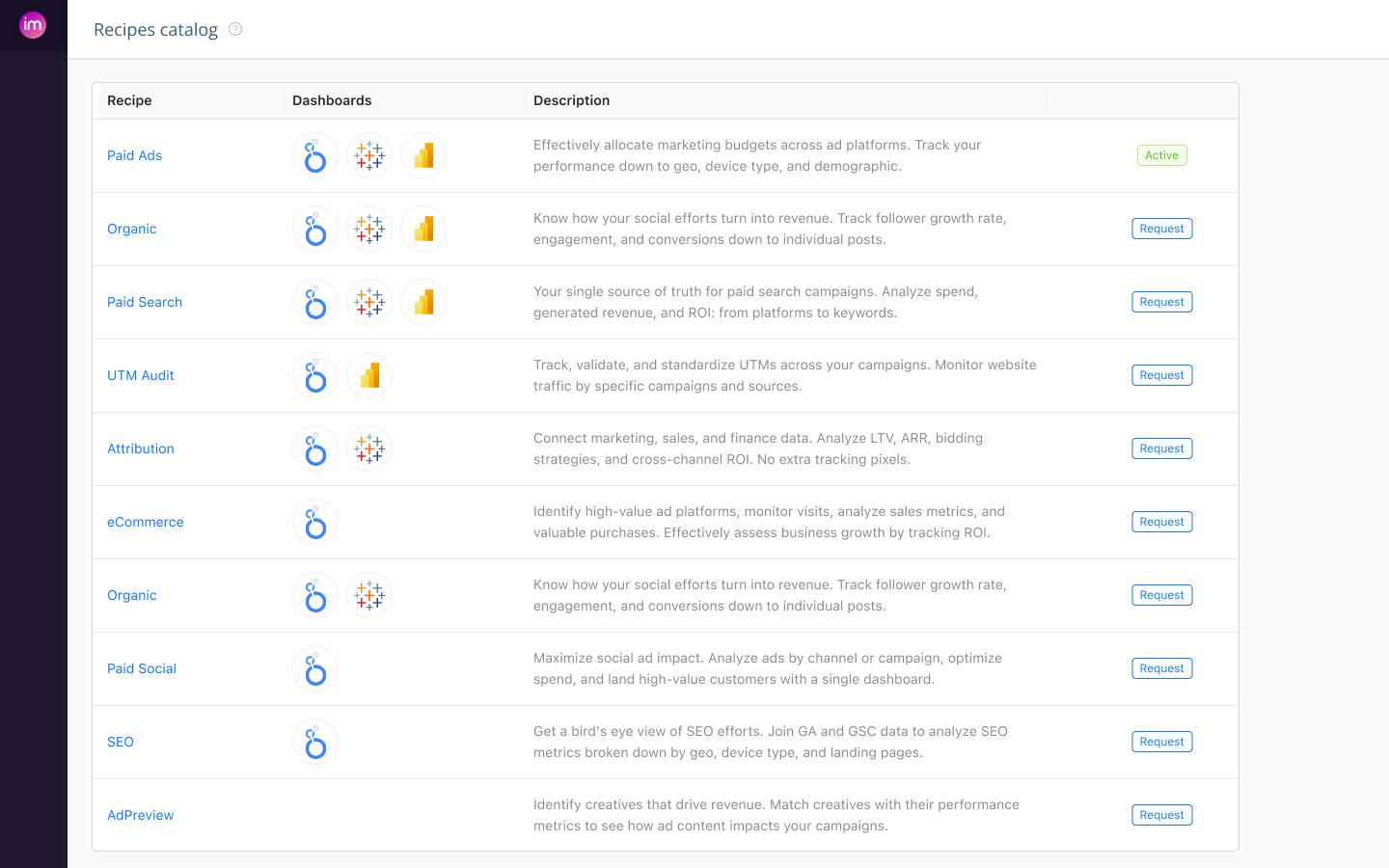
2. Data Warehouses
Data warehouses store a large amount of structured data from different sources. They are designed to aggregate and organize data in a way that makes it easily accessible for analysis.
Impact on departments: Both departments can use historical data for trend analysis, to make smart decisions backed with data. It helps sales teams spot customer buying patterns. Marketing teams can assess campaign effectiveness across time.
3. Data Analytics
Data analytics toolkits range from programming languages (such as Python and R) to full-fledged analytics platforms that process and analyze data to extract actionable insights from complex data sets.
Impact on departments: With data analytics sales and marketing can identify hidden opportunities, make precise revenue forecasts, and plan with greater accuracy. The use of programming languages allows for custom analysis and automation, while analytics platforms provide robust environments for BI specialists to work more efficiently.
4. Data Front-End (UI)
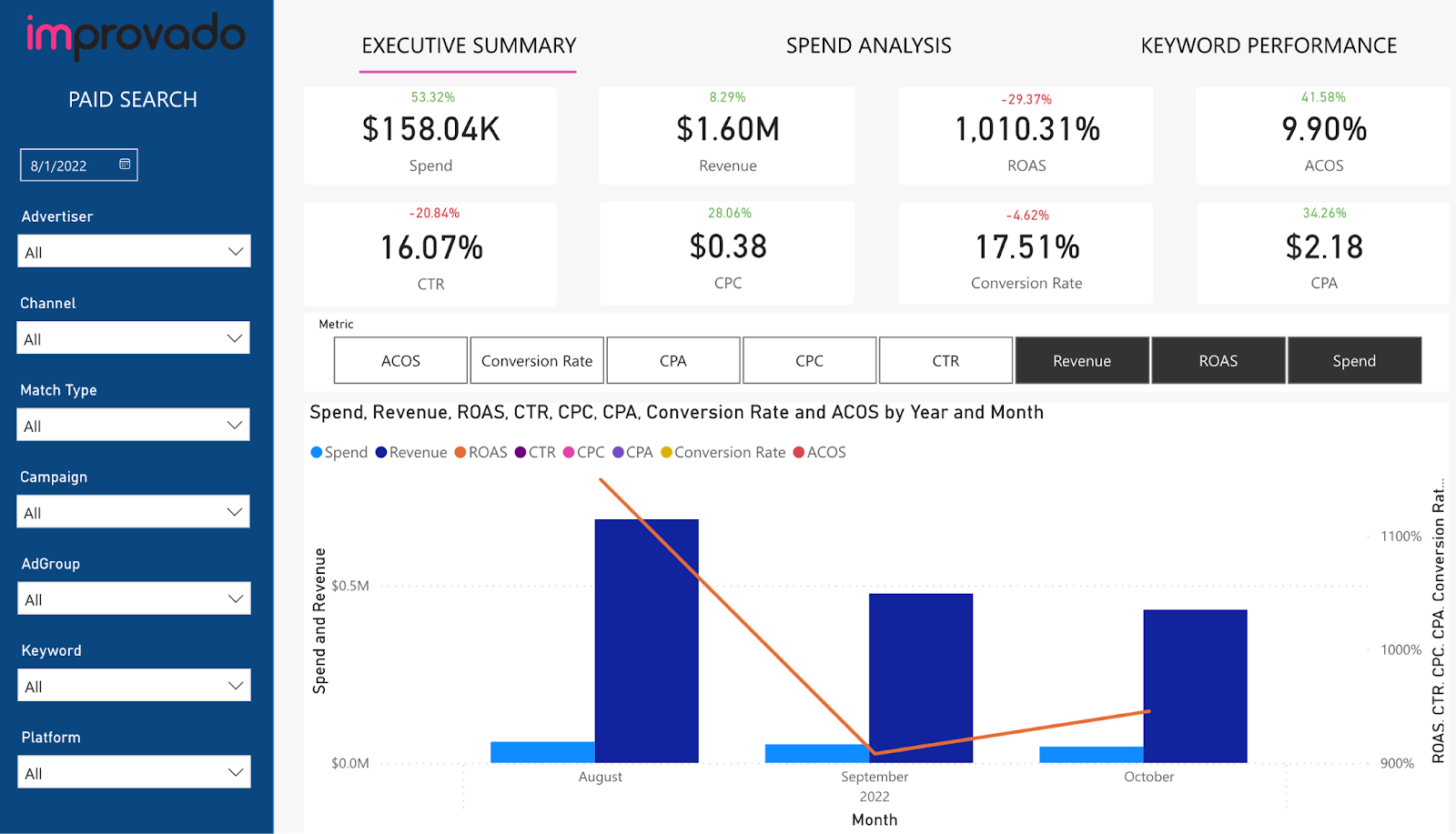
Data frontend refers to the visualization and interaction layer of BI tools, including dashboards and interactive reports. This component focuses on making data insights accessible and understandable through visual representation, enabling users to interact with their data intuitively.
Impact on departments: A well-designed data frontend democratizes data access, allowing everyone to easily understand and interact with data insights. Marketing can spot anomalies in campaign behavior early on and act proactively. Sales can monitor performance metrics while execs can oversee company-wide KPIs at a glance, fostering a data-driven culture.
Together, these components form the backbone of BI systems, transforming raw data into actionable insights.
The Synergy of Marketing and Sales Intelligence in Business Strategy
Aligning Goals and Strategies
One of the main goals of business intelligence in sales and marketing is to make insights available to everyone. When teams share insights into their performance, it’s much easier to achieve common goals.
Here's how it works:
- Shared Data Insights: Sharing and analyzing common insights is key. For instance, marketing might spot a trend toward AI functionalities in a product, while sales might hear directly from customers. Sharing these insights allows both teams to quickly pivot: marketing emphasizes AI in campaigns, and sales highlight it in conversations.
- Unified Approach to Goals: Aligning marketing and sales intelligence ensures both departments target the same goals. For example, it helps craft efficient marketing campaigns that target the right ICP improving overall conversion and retention rates.
Enhancing Customer Experience
Business intelligence can also significantly enhance customer experience. Here's how it works:
- Personalized Interactions: When businesses look at customer data from both marketing and sales perspectives, they can make their interactions more personal. This way, they meet each customer's likes and needs better. Customers feel more special and understood, which improves the whole experience.
- Anticipating Needs: Knowing customer preferences helps companies expect their needs proactively. They can suggest complementary products or offer help preemptively.
- Consistent Messaging: Sharing insights between marketing and sales helps to develop consistent messaging. Customers can better grasp company values, fostering loyalty.
Tools for Marketing and Sales Intelligence
The most effective way to build sales and marketing BI processes is to use specialized tools. They help businesses transform raw data into analysis-ready insights and democratize access to them. Let's check out some top tools and platforms available:
Improvado
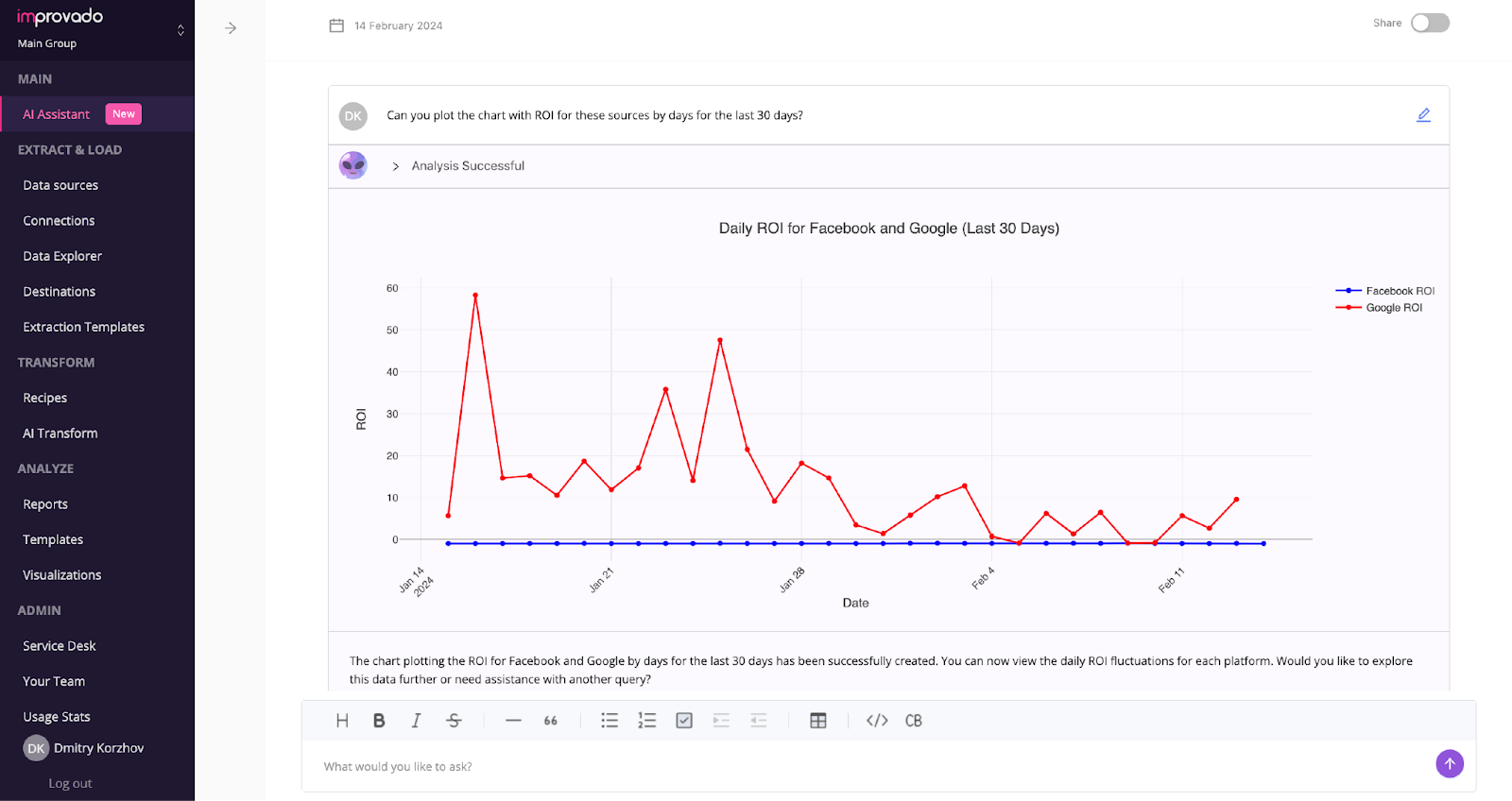
Improvado is an AI-powered, unified marketing intelligence and analytics platform that is designed for marketers and businesses to unlock the power of data to drive impactful business decisions. Improvado connects data across 500+ sources, gathers data in a centralized warehouse, transforming it into strategic insights, and facilitates analysis and presentation through rich, actionable reports.
Key features:
- Data Integration: Improvado integrates with pre-built and custom sources, extracts granular data, and loads it into a flexible data storage that complies with all modern data privacy regulations.
- AI-driven analytics: Improvado's AI Agent revolutionizes data access, allowing users to query marketing and sales data in natural language for instant, actionable insights.
- Real-time Reporting: Improvado offers customizable dashboard templates for all popular visualization platforms, allowing for quick deployment and real-time reporting with the user’s favorite tools.
Pricing: Improvado offers custom pricing tailored to the client’s specific needs and scale. Contact Improvado directly to get a quote.
Tableau
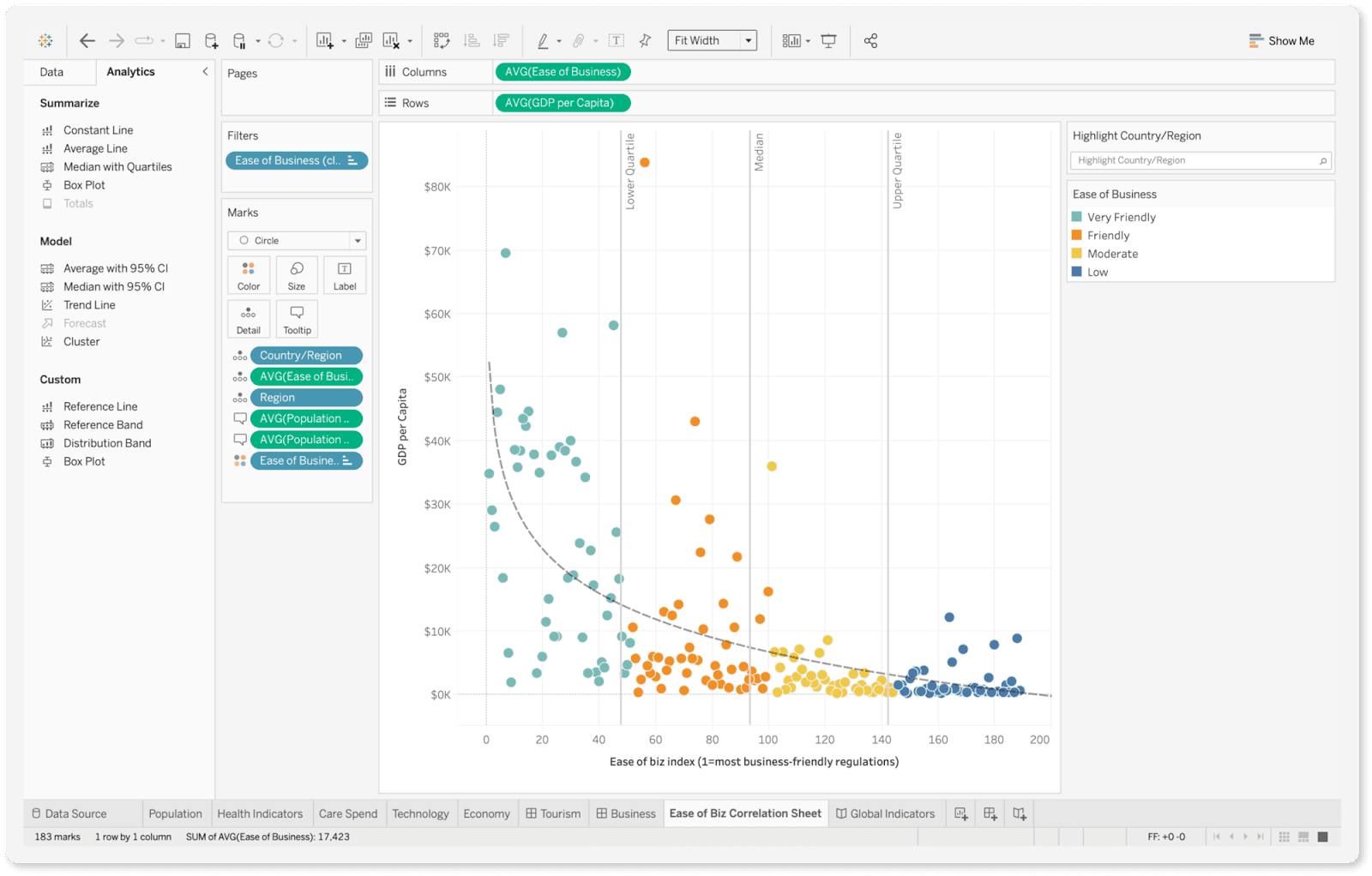
Tableau, a leading BI and data visualization tool, offers integrations with diverse data sources, including cloud services and SQL databases. The platform allows users to dive deep into predictive analytics without the need for advanced statistical knowledge.
Key features:
- Data transformation: Tableau Prep, streamlines the process of cleaning and combining data, making it analysis-ready. The drag-and-drop interface makes data preparation tasks easier, enabling users to focus more on analysis and less on data wrangling.
- Data visualization: Tableau offers a wide range of visualization types, enabling users to tell complex data stories through simple charts, intricate interactive maps, and everything in between.
- Data integration: Tableau connects directly with 90+ data sources, including cloud services, big data solutions, and SQL databases such as MySQL and SQL Server. The platform also benefits from native integrations with Salesforce products.
Pricing: Offers different pricing plans starting from $70 per user/month for individual users, with more extensive plans available for teams and organizations.
HubSpot Marketing Hub
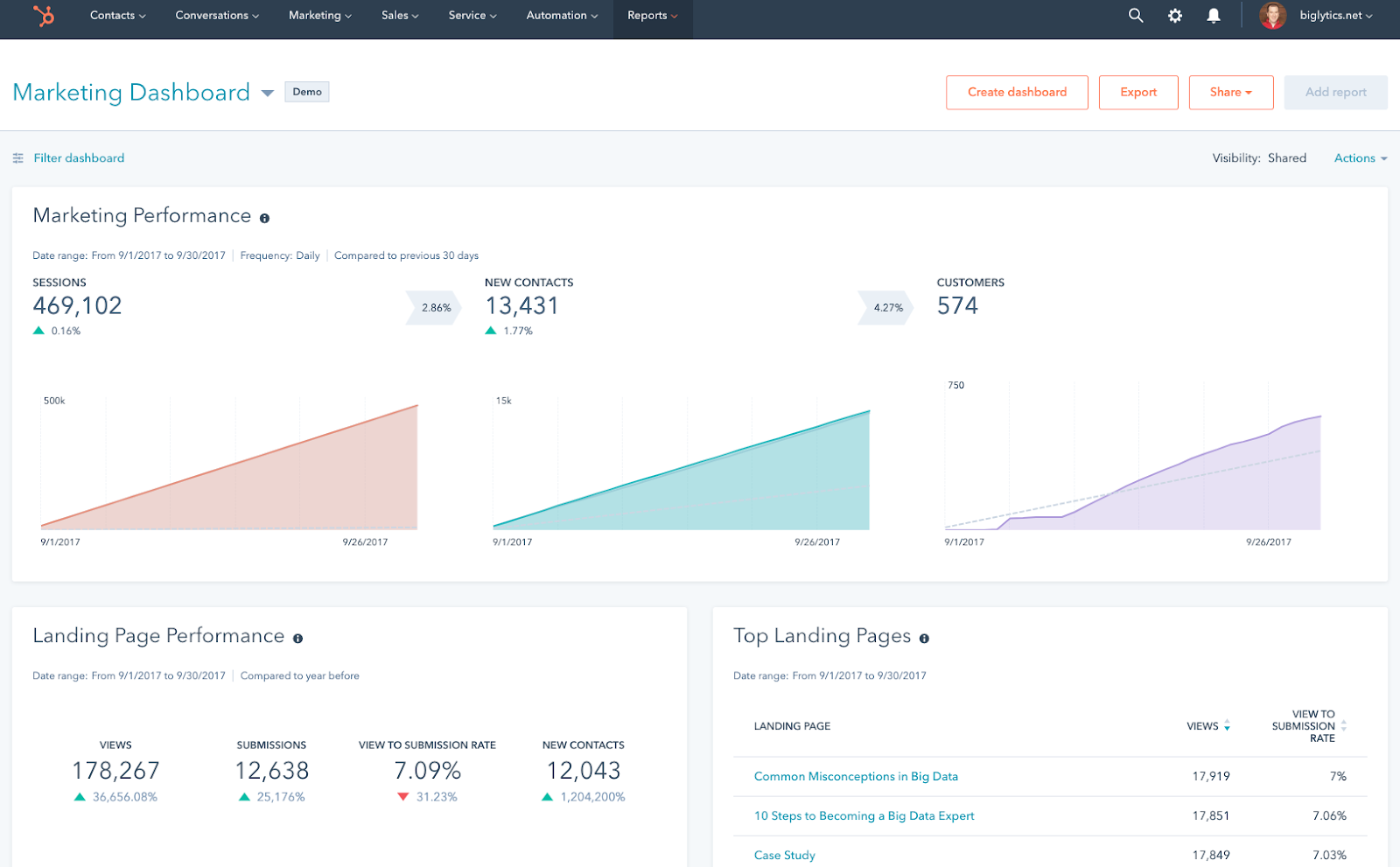
HubSpot Marketing Hub is an all-in-one inbound marketing tool that assists businesses in attracting visitors, converting leads, and analyzing the effectiveness of marketing campaigns.
Dashboards and reporting is one of Hubspot’s product branches designed to empower teams with accessible analytics. It allows for the integration of CRM data with marketing, sales, and service data, creating a unified source for insightful reports. This tool aims to streamline data management, offering pre-built dashboard templates and customization options for varied business needs, enhancing data-driven decision-making across the organization.
Key Features:
- Marketing and sales automation: Automate routine tasks like lead scoring, funnel stage progression, and more.
- CRM integration: Hubspot’s CRM gathers an all-around portrait of your prospects, allowing you to use this data in further analysis and visualizations.
- Dashboarding: Hubspot integrates data from your existing business apps to unite all your data — and build powerful dashboards and reports.
Pricing: Free tier available; premium plans start at $45 per month, with more advanced features available at higher tiers.
Salesforce Marketing Cloud Intelligence
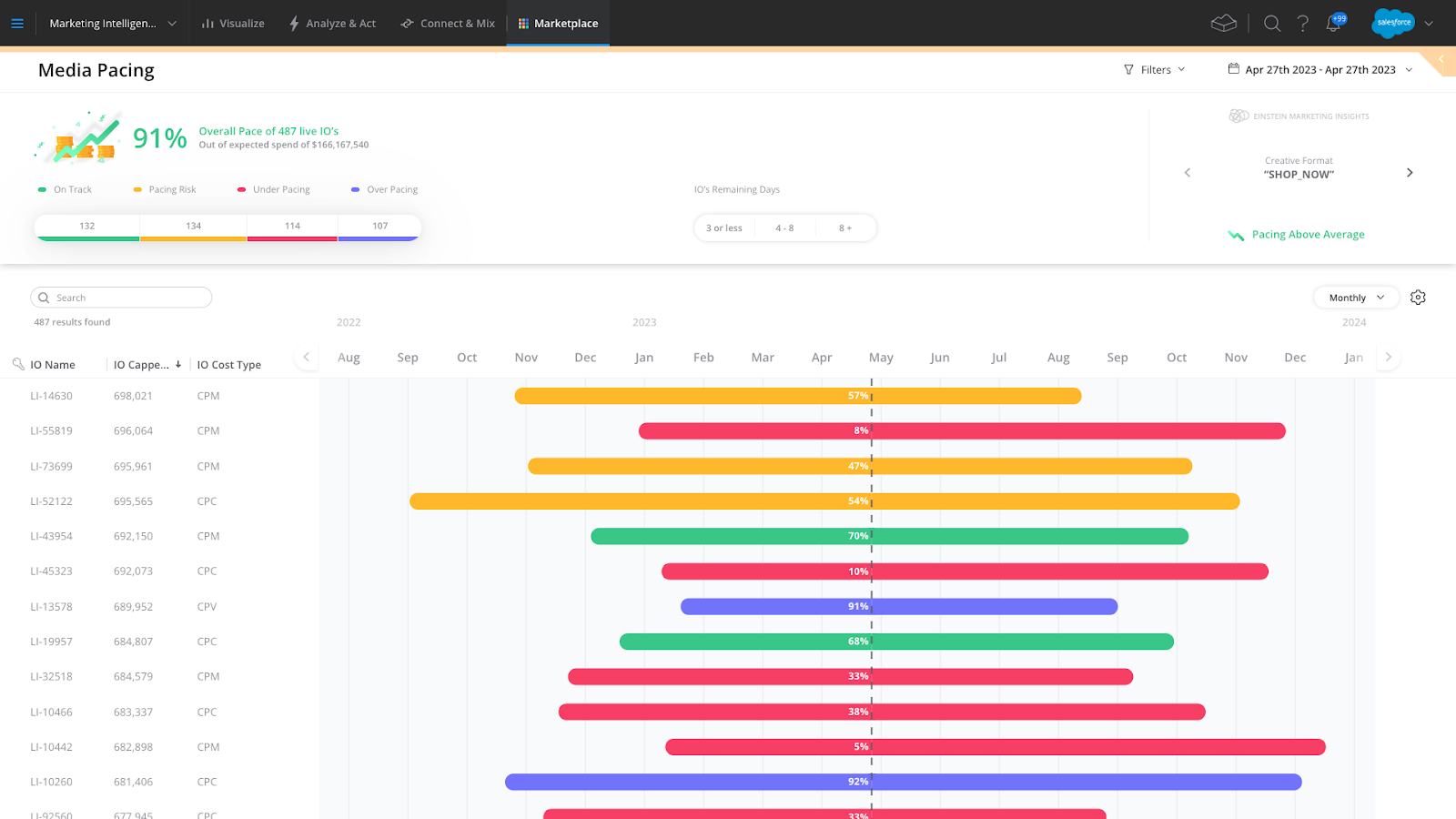
Salesforce Marketing Cloud Intelligence is akin to a Lego set, offering a suite of components and add-ons that can be customized to meet diverse marketing needs. It handles data import and management by aggregating information from various sources through API connectors and file uploads, creating continuous data streams that are rich in metadata.
The platform enables BI specialists with data harmonization tools for unifying, enriching, and validating data.
Salesforce provides a highly customizable CRM platform that encompasses sales, customer service, marketing automation, and analytics, offering a 360-degree view of every customer.
Key Features:
- Customer 360: Integrates data across sales, service, marketing, and more to build complete customer profiles.
- AI-Powered Analytics: Salesforce's Einstein AI offers predictions and recommendations based on your data.
- Extensive Ecosystem: Access to thousands of applications through the Salesforce AppExchange.
Pricing: Salesforce offers several CRM editions, starting from $25 per user/month for the Essentials plan, with more advanced plans providing additional features and customization options.
Power BI
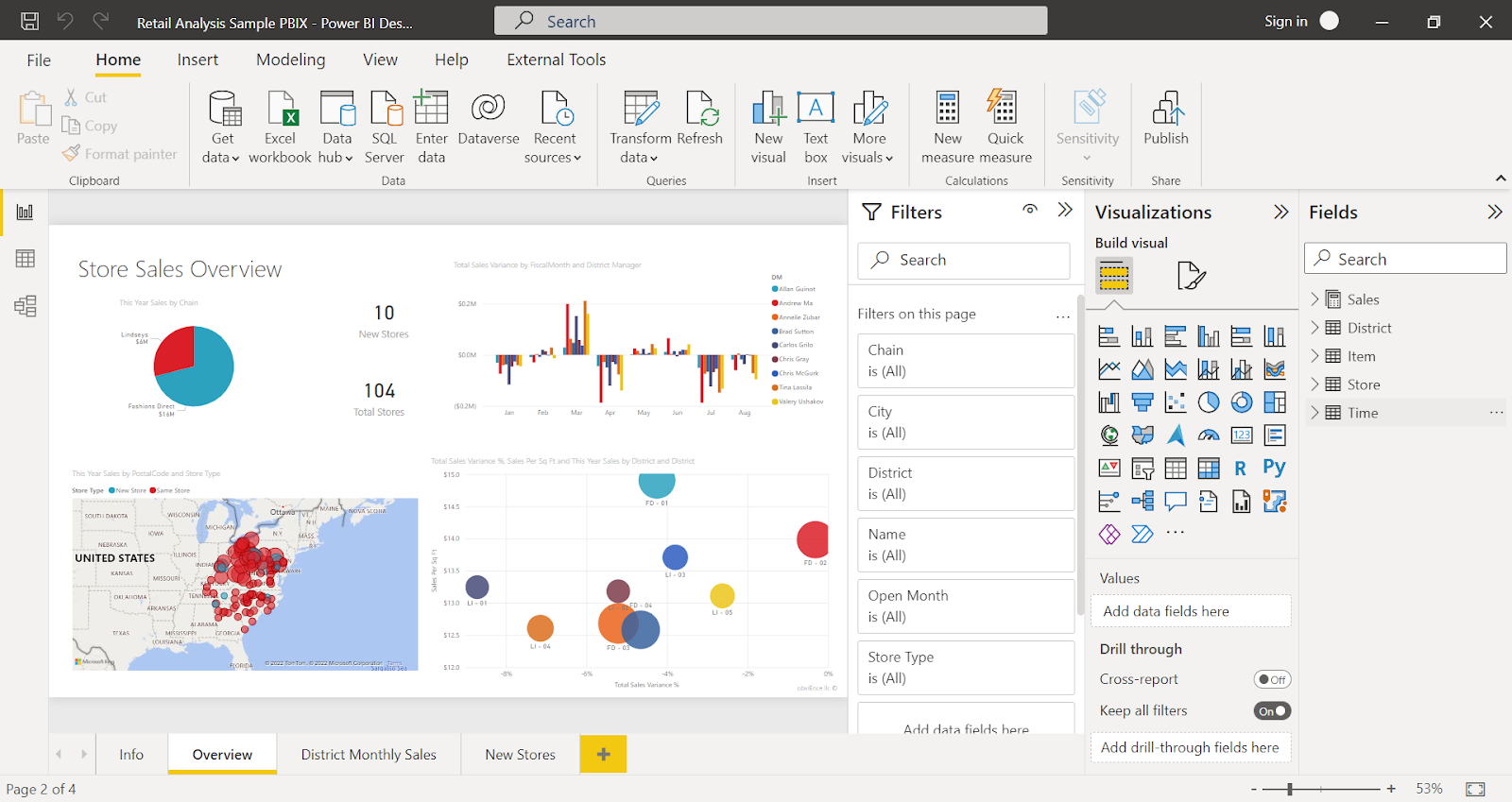
Power BI is a suite of analytics tools provided by Microsoft, offering comprehensive business intelligence capabilities that allow users to connect to various platforms, visualize data, share insights, and make informed decisions. It enables users to consolidate disparate data sets into a unified view, facilitating a comprehensive analysis landscape. This level of integration is particularly beneficial for enterprises looking to leverage data from multiple business units or platforms.
Key Features:
- DirectQuery allows for real-time data querying without the need for importing or copying data into Power BI which is particularly useful for working with large datasets or when up-to-the-minute data is required.
- On-premises data gateway enables secure data connectivity from on-premises data sources to Power BI service in the cloud.
- The composite models feature allows users to combine data from multiple sources into a single model. This enables analysts to create reports that draw on data from both imported datasets and DirectQuery sources, offering flexibility in handling complex data scenarios.
Pricing: A free version is available with limited capabilities; the Pro version is priced at $9.99 per user/month, offering full collaboration capabilities and access to the full range of Power BI features.
Choosing the Right Tool
Selecting the most appropriate marketing and sales intelligence tool depends on several factors:
- Business Size: Smaller businesses prefer simple, affordable tools. Larger enterprises need customizable, comprehensive solutions tailored to their use case and business specifics.
- Specific Needs and Goals: Identify the key objectives your business aims to achieve with marketing and sales intelligence—be it enhanced lead generation, customer segmentation, precise sales forecasting, or others.
- Integration Capabilities: Consider how well the tool integrates with existing platforms and data sources your business uses.
- Budget: Evaluate the cost against the expected ROI, considering both upfront expenses and long-term value.
Implementing Marketing and Sales Intelligence in Your Business
Integrating sales and marketing BI platforms is a challenging task. Although it can enhance decision-making and streamline operations, it takes time and dedication to set up the processes and master BI tools. Here are five best practices to ensure that the process goes smoothly.
Marketing and Sales BI Integration Best Practices
- Start with Clear Objectives: To start, know your goals for marketing and sales intel. Want better leads, more sales, or know customers? Setting clear goals helps your integration process.
- Ensure Cross-Departmental Collaboration: Marketing and sales intelligence impacts various parts of the organization. Ensure there's collaboration across departments. This fosters a unified approach to data collection, analysis, and utilization.
- Choose Tools That Integrate Well: Choose tools that seamlessly connect with your current MarTech setup. Some tools effortlessly blend with widely-used CRM systems, marketing automation platforms, and data analytics tools, cutting down on learning time and setup.
- Provide Training and Support: Equip your team with the knowledge and skills they need to make the most out of these tools. Training sessions, tutorials, and ongoing support can help ensure that your team is comfortable and proficient with the new technology.
- Iterate and Improve: Integration isn't a one-time event but an ongoing process. Continuously gather feedback from users, analyze usage data, and make necessary adjustments to ensure that the tools are meeting your business needs.
Enhance Decision-Making with Reliable Data
Tools and advice provided in this article will help you assemble the marketing and sales BI system tailored to your business case. However, it’s crucial to remember that every BI process starts with well-organized and clean data. For marketing and sales data, a platform like Improvado can help you.
Improvado automates data integration from over 500+ marketing and sales sources, turns raw data into analysis-ready format, seamlessly integrates with any data visualization platform, or provides insights via AI Agent.
.png)



.png)
